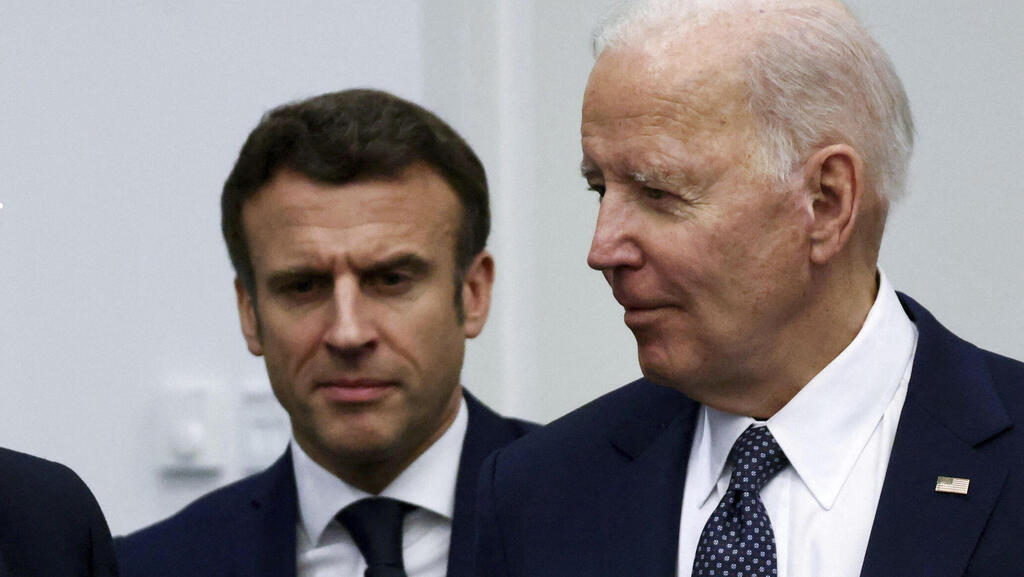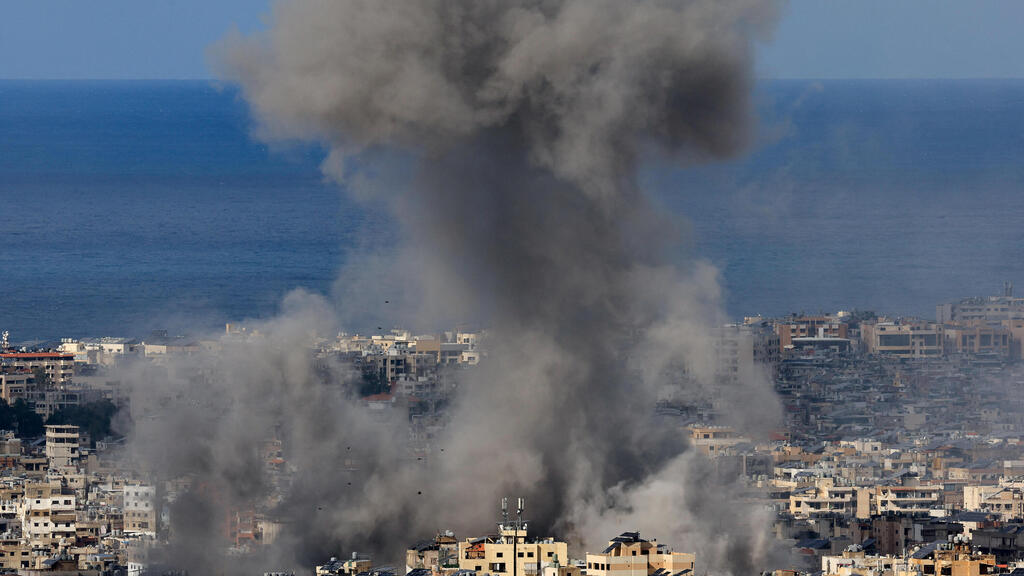Getting your Trinity Audio player ready...
The IDF said on Tuesday it would enforce the terms of the cease-fire deal that would end the fighting in Lebanon, and is expected to come into effect within days, as negotiations appear to be nearing their conclusion. The security cabinet will convene later in the day to approve the agreement. It will not be brought to the full cabinet or the Knesset.
"The military is currently engaged in combat and will know how to enforce and act in accordance with any decision made by decision-makers," the IDF said in a statement.
3 View gallery


Iran's Supreme Leader Ayatollah Ali Khamenei, IDF Chief of Staff LTG Herzi Halevi
(Photo: AFP, IDF Spokepserson's Unit REUTERS/Mohammed Yassin, Iranian Leader's Press Office - Handout/Getty Images )
IDF Chief of Staff Lt. Gen. Herzi Halevi attended a meeting of NATO chiefs of staff held in the UK.
According to a report in the New York Times, Iran's Supreme Leader Ayatollah Ali Khamenei approved the emerging agreement. According to sources in the IRGC, an agreement has already been reached and Hezbollah has effectively agreed to the cease-fire.
The cover of Hezbollah-affiliated outlet Al-Akhbar featured a photo of Prime Minister Benjamin Netanyahu from behind at the UN General Assembly, with the caption: "The agreement is near; the lesson is being implemented."
The paper claimed the "resistance" and its capabilities remains intact regardless of whether Hezbollah forces are north of south of the Litani River. "If this isn’t another maneuver by the Israeli prime minister, then the Lebanese are very close to the end of Israeli aggression,” the paper wrote.
During a situational assessment held by the IDF on Monday, concerns were raised about fire from Lebanon intensifying, including significant "concluding salvos,” in the potential final days of the conflict. The Homefront Command issued new guidelines for communities in the north, in expectation for Hezbollah efforts to end the fighting with images of Israeli casualties and damage.
Al-Akhbar also reported on Tuesday that preparations have begun for a special Lebanese cabinet meeting on Wednesday, contingent on Israel's official approval of the agreement in the security cabinet meeting.
Lebanese celebrating proposed cease-fire deal
The report noted that during the session, Lebanese ministers will be presented with the implementation mechanism for UN Resolution 1701, which serves as the basis for the current agreement, and would be asked to ratify it.
Four senior Lebanese officials on Monday said that U.S. President Joe Biden and French President Emmanuel Macron are expected to present the cease-fire agreement within approximately 36 hours. However, the White House tempered these reports, saying, "We're close to a cease-fire, but it's not finalized yet."
Even if Biden and Macron announce the cease-fire, it won’t take effect until the Israeli Security Cabinet approves it, with a meeting scheduled for 4:00 p.m. Netanyahu doesn’t plan to bring the agreement to the government or Knesset for approval, as it’s a cease-fire agreement rather than a diplomatic treaty. "The cabinet is authorized to decide on war and is also authorized to decide on a cease-fire," Israeli officials explained.
Once approved, the cease-fire would take effect within hours or by the next day. Amid reports of the anticipated announcement by Biden and Macron, a senior political source suggested the declaration will likely be made on Wednesday morning following the cabinet’s approval. "This will be an American-French announcement and both sides will declare their acceptance," the source added.
The three reasons behind Israel's decision
A senior official outlined Israel’s rationale behind advancing the cease-fire agreement, citing three primary reasons. "First, we aim to prevent, as much as possible, a UN Security Council resolution addressing both the north and the south. We're in a transitional period for the U.S. administration and we understand the complexity and sensitivity involved, so we want to avoid that. Once a resolution is passed, it becomes irreversible. Therefore, we're doing everything to prevent it."
The second reason mentioned was the need to refresh the forces. "Reserve soldiers have been engaged in over a year of fighting, moving from Lebanon to Gaza and back. We want to allow them to regroup and regain strength," he said.
The third reason highlighted was severing the connection between Gaza and Lebanon, "which Hamas opposes." He elaborated, "Hamas's interest is to continue receiving support from Hezbollah and Iran.”
“We're disrupting that, disconnecting the fronts, leaving Hamas isolated in the war, along with the added military pressure. We hope that the strategic and diplomatic measures, combined with ongoing military pressure, will lead to a deal for releasing hostages,” he explained
He further stressed, "We remain committed to acting against Hezbollah and any threat. What's critical is our enforcement capability and we have it. The cease-fire will be tested on the ground. If the cease-fire holds, so will the overall situation. If not, we'll strike Hezbollah."
"It's essential to note that our priority is to get through these next two months,” The senior official added. “Hezbollah is a completely different terror organization than it was on October 6 — we've eliminated its entire leadership, including [Hassan] Nasrallah. He was the one directing Iran's actions at times."
Addressing the agreement details, he said, "Several border adjustments in the accord favor Israel. We're not returning Hezbollah prisoners — there's no such clause in the agreement."
Overall, he described the agreement as "only a piece of paper." Therefore, "What's most important is securing a side letter from the U.S. granting us the right to act when necessary —whether against terror infrastructure, missile shipments or other threats.
“If we identify such activities, we have the right to unleash firepower and retaliate against Hezbollah and Lebanon, including via operations beyond the Litani River. Attempts to deliver weapons from Syria to Lebanon will also warrant action, including strikes on [Bashar] Assad regime targets as we've done in the past."
Get the Ynetnews app on your smartphone: Google Play: https://bit.ly/4eJ37pE | Apple App Store: https://bit.ly/3ZL7iNv
He added, "The addendum isn’t a public document, nor will it be signed. The supervision mechanism will be more effective since it will be led by the U.S. — not with American forces on the ground, but under U.S. political leadership. The IDF will gradually withdraw southward until returning to Israel during the agreement’s initial 60-day period."
The official also noted that "Israel is negotiating with the Biden administration and it’s estimated that the agreement will allow the U.S. to lift delays on arms supplies. However, this isn’t presented as an incentive or condition."







